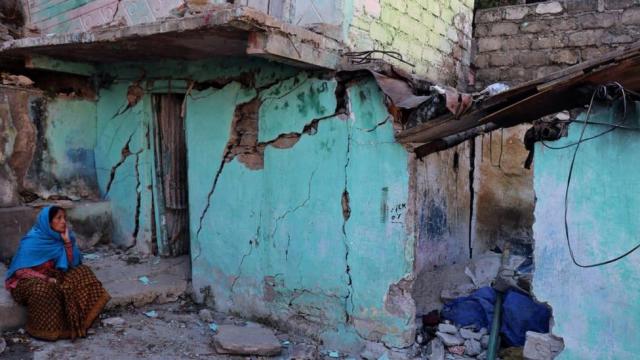Authorities in a town in northern India are tearing down structures that had started to break as a result of shifting soil, prompting hundreds of people to flee for their lives.
According to Indian media reports, the demolition drive in Joshimath, a town of 25,000 people in the state of Uttarakhand, started on Tuesday. Authorities reportedly divided the town into “danger,” “buffer,” and “completely safe” zones.
Authorities report that a total of 678 buildings in the town, which is located 1,890 meters (6,200 feet) above sea level, have developed cracks.
Joshimath, which is located 490 kilometers (305 miles) northeast of the national capital New Delhi, is a popular destination for travelers who want to trek through the Himalayas. It is a gateway to Hindu and Sikh shrines. In addition, it is not far from the China-India border.
“It appears that 30% of Joshimath is impacted. An official stated that a report was being put together by an expert group and will be delivered to the Prime Minister’s Office.
According to Himanshu Khurana, the district magistrate of Chamoli, where the town is located, “basic facilities in the relief camps set up for the afflicted people in Joshimath are being continually reviewed by the administration and all possible help is being offered to the affected people.”
In the meantime, India’s Supreme Court on Tuesday turned down a request for an immediate hearing on the subject and scheduled the next hearing for January 16.
According to a report in The Indian Express newspaper, the court stated that “anything which is significant need not come to the apex court.”
Experts and locals have long cautioned against extensive construction projects in and near Joshimath, particularly those for power projects constructed by businesses like the government-run National Thermal Power Corporation (NTPC).
The largest power producer in India, NTPC, claims that the town’s fractures are not the result of its tunneling or other construction activities.
A government official remarked, “There is no possibility the project is behind the subsistence,” adding that NTPC had stopped tunneling operations in the region more over two years ago when a boring machine became stuck.
The officer, who requested anonymity because he did not have permission to speak to the media, continued, “Blasts under unavoidable circumstances have been carried out miles away from the population and the damaged area.”
The official stated that the affected tunnel was a kilometer away from the affected area and a kilometer deep.
Khurana previously disclosed to Reuters that construction on a few border road projects as well as the 520 megawatt Tapovan Vishnugad hydropower station had been put on hold.
Six buildings from four different wards have been deemed to be extremely risky, Khurana told Reuters. According to the advice and direction of federal specialists, “We will demolish some hazardous buildings.”
Scientists started to worry about how climate change would affect the highest mountains in the globe after a flash flood in the area in 2021 left around 200 people dead or missing in addition to destroying two hydropower projects that were being developed. The NTPC project was one among them.
Meanwhile, 50-year-old local resident Prakash Bhutiyal reported that seven of the eleven rooms in his Joshimath home/guesthouse had developed cracks and were awaiting relocation to a more secure site.
He said, “Our family of nine has been confined to only one room.” “We’ve left all of our possessions out in the open. We have not yet been moved to a safer location.





